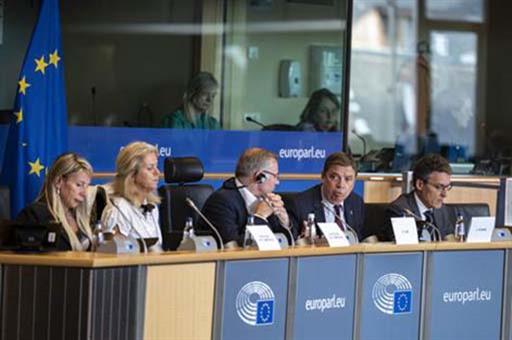During his appearance before the European Parliament's Committee on Fisheries
Luis Planas advocated for the need to improve the procedure for allocating fishing quotas
News - 2023.9.20
In this respect, he pointed out that the Spanish Presidency of the Council of the European Union (EU) is going to promote the adoption of multiannual TACs and quotas for 2024 in fisheries for which scientific data allow it. This will enable the sector to better plan its activity and employment according to quotas.
Luis Planas spoke today at the European Parliament's Committee on Fisheries in Brussels, where he acknowledged the "immense amount of work" carried out by the whole of the Community fisheries and aquaculture sector, whose "challenges we must recognise". He stressed that their work is essential for ensuring food security, as well as being "at the forefront of environmental sustainability".
According to the minister, the strategic importance of this sector requires due attention from EU institutions and joint efforts to protect marine resources and improve the profitability of fishing activities. "There is no sustainability without profitability," he stressed. To this end, he pointed out that generational change must be encouraged, digitalisation must be accelerated to increase the competitiveness of the sector and a level playing field must be guaranteed in the international context, among other issues.
Priorities for the Spanish Presidency
In his speech, Planas stressed that establishing multiannual fishing quotas is one of the main priorities for the Spanish Presidency of the Council of the European Union. He explained that this change will bring greater stability to fisheries management, better business planning and greater predictability to fishing activity.
Planas also stressed that the decarbonisation and modernisation of the fishing fleet, as well as generational replacement, are essential for guaranteeing the viability of the sector. He stressed that "21st century fishing needs 21st century boats". In this respect, he called for a reflection on changing approaches to finance the modernisation of vessels for the next financial framework, which opens in 2027. This issue was at the heart of debates at the Informal Meeting of Fisheries Ministers, held in Vigo last July, where the need to facilitate lines of investment and European funds to renew the fleet and encourage research into alternative energies was raised.
Similarly, Planas pointed out that the Spanish Presidency wants to promote recognition of the strategic role that fisheries and aquaculture play in food security, so that citizens have access to sustainable food at reasonable prices. This issue will be analysed at the next meeting of the Directors-General for Fisheries, which will take place in Malaga on 28 and 29 September, where the contribution of the Common Fisheries Policy to European food security will be discussed.
According to the Minister, the development of these three priorities for the Spanish Presidency will contribute to advancing the Common Fisheries Policy (CFP) to regulate the sustainable development of fishing activity as a guarantor of food supply and a fair living standard for those working in the fishing and aquaculture sector.
The Minister indicated that Spain is closely monitoring the scientific recommendations that support the allocation of fishing opportunities in the Northwest Atlantic by 2024, based on maximum sustainable yield. He also assured that managing fisheries in the Mediterranean is a challenge that must be faced in a way that ensures the profitability and survival of the sector.
Similarly, he pointed out that discussions with the United Kingdom, Norway and multilateral discussions with coastal states will be promoted, with the aim of establishing the species and quotas that the European Union will have available in their respective waters.
In particular, he referred to the complexity of the negotiations with Norway to establish fishing opportunities in 2024, an issue which was extensively discussed at the last EU Council of Ministers. Planas indicated that the vast majority of the Council and the Commission consider it necessary to introduce commercial aspects in these negotiations, if necessary, "because it is not acceptable for us to be recognised as having fishing rights in international agreements and, at the same time, for the result of these catches to be sold to us".
The Minister also added that the Spanish Presidency will work on renewing EU bilateral fisheries agreements with third countries and on regulations relating to the work carried out by regional fisheries organisations.
Non official translation





